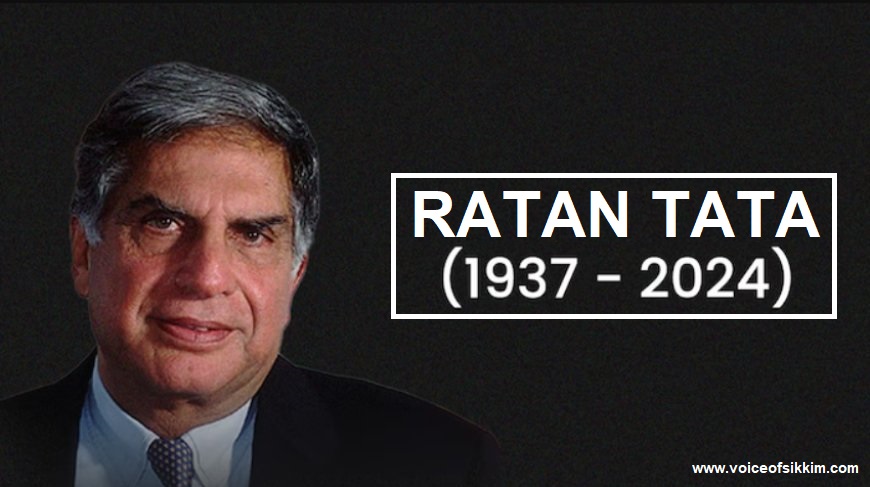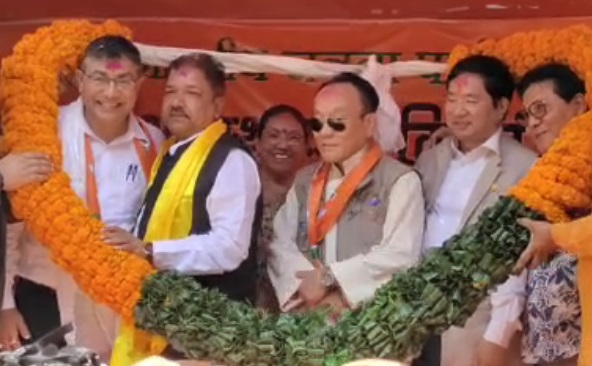
Mumbai, Oct 10 : Ratan Naval Tata, the iconic Chairman Emeritus of Tata Sons, passed away on October 9, 2024, at 86, due to age-related health issues. Ratan Tata was the great-grandson of Jamsetji Tata, the founder of the Tata Group. He was admitted to Breach Candy Hospital in Mumbai, sparking widespread concern about his health.
As news of his passing spread, tributes poured in, with N Chandrasekaran, Chairman of Tata Sons, hailing him as a “truly uncommon leader” whose contributions transformed not just the Tata Group but India as a whole.
Tata’s remarkable career spanned over five decades, with him joining the Tata group in 1962. He led the company from 1991 to 2012, expanding its global footprint and growing revenues to over $100 billion. Under his leadership, Tata Group made strategic acquisitions, becoming a global business powerhouse with over 65% of revenues from international operations.
A renowned philanthropist, Tata revolutionized charity in India through the Tata Trusts. His initiatives in education, healthcare, and rural development have touched millions of lives. He received numerous accolades, including the Padma Bhushan and Padma Vibhushan, India’s third and second-highest civilian honors.
Tata’s legacy extends beyond business, inspiring generations with his humility, integrity, and commitment to excellence. His impact on Indian industry and society will be deeply felt, and his contributions will continue to benefit generations to come.
He is survived by his family members comprising brothers sisters, including Simone Tata, Jimmy Tata, Noel Tata, Aloo Tata, Shireen Jejeebhoy, Deanne Jejeebhoy, Leah Tata, Maya Tata, Neville Tata, Manasi Tata, Jamset Tata, Tiana Tata and others, said a family statement.
The mortal remains of Ratan Naval Tata will be kept at the National Centre for Performing Arts (NCPA) in South Mumbai’s Nariman Point from 10.30 am to 4 pm on Thursday for people to pay their respects. At 3.30 pm, his body will be taken to the Worli crematorium for last rites. Home Minister Amit Shah will attend the last rites of Ratan Tata on behalf of the Centre.
Tata Group Tweets
— Tata Group (@TataCompanies) October 9, 2024
Earlier Ratan Tata shared in his X.com (Formerly Twitter) Regarding His Health Condition
Thank you for thinking of me 🤍 pic.twitter.com/MICi6zVH99
— Ratan N. Tata (@RNTata2000) October 7, 2024
Ratan Tata’s family issued a statement following the passing of the esteemed industrialist at the age of 86. He passed away at Mumbai’s Breach Candy Hospital, where he had been admitted just a few days earlier.

Facts About Iconic Tata Group Chairman , Chairman Emeritus of Tata Sons
- Ratan Tata was born on December 28, 1937, in Mumbai, into one of India’s most illustrious industrial families. He was the great-grandson of Jamsetji Tata, the visionary founder of the Tata Group, a company that has played a pivotal role in India’s industrial development. His parents, Naval Tata and Sooni Tata, separated in 1948, after which Ratan was raised by his grandmother, Navajbai Tata.
- In 1961, after completing his education, Ratan Tata began his journey with the Tata Group at Tata Steel. He chose to work on the shop floor, gaining hands-on experience and understanding the intricacies of manufacturing, which shaped his practical approach to leadership.
- Although he came close to marriage several times, Ratan Tata remained unmarried. He once shared that while working in Los Angeles, he fell in love, but due to the 1962 Indo-China war, the relationship didn’t progress as her parents were reluctant to let her move to India.
- Ratan Tata’s career reached new heights when he succeeded J.R.D. Tata as the chairman of the Tata Group in 1991. His leadership came at a pivotal time, coinciding with India’s economic liberalization, which opened up vast new opportunities for Indian businesses. Ratan Tata led the Tata Group through this era of transformation.
- During his tenure, the Tata Group expanded globally, with several key acquisitions that enhanced its international presence. These included Tata Tea’s acquisition of Tetley in 2000, Tata Motors’ purchase of Jaguar Land Rover in 2008, and Tata Steel’s acquisition of Corus in 2007. These strategic moves elevated Tata into a globally recognized brand.
- Ratan Tata also championed innovation within the automotive sector. He was instrumental in the development of the Tata Indica, India’s first indigenous car, and the Tata Nano, which was launched in 2009 as the world’s most affordable car, aimed at making car ownership accessible to the masses.
- Beyond business, Ratan Tata was deeply involved in philanthropy. Through the Tata Trusts, which hold a substantial part of the group’s wealth, he supported initiatives in healthcare, education, and rural development. His contributions left an indelible mark on Indian society.
- In 2012, Ratan Tata stepped down as chairman of Tata Sons, but his influence endured. He was honored with the title of chairman emeritus for several Tata companies, including Tata Sons, Tata Motors, Tata Steel, and Tata Chemicals. His legacy continued to guide the group long after his retirement.
- Ratan Tata’s leadership was defined by integrity, vision, and humility. He steered the Tata Group through a period of remarkable growth while always considering the greater good of the nation and maintaining the company’s core values.
- Despite his monumental success, Ratan Tata remained grounded, committed to ethical practices, and focused on giving back to society. Though his time at the helm may have ended, his legacy remains an inspiration to generations of leaders and entrepreneurs.
Ratan Tata’s Bond with the Masses

Tata vehicles—trucks, buses, and SUVs—are a familiar sight on Indian roads, a testament to Ratan Tata’s deep connection with the everyday lives of people across the country. Understanding the needs of the Indian market, he consistently focused on making products that were accessible and impactful.
In 2008, Ratan Tata made global waves with the launch of the Tata Nano, the world’s most affordable car. This ambitious project was driven by his determination to provide an affordable mobility solution for India’s growing middle class. Often referred to as the “1 lakh car,” Tata fulfilled his promise, ensuring the base model was priced at Rs 1 lakh, a feat that resonated deeply with consumers. His vision made car ownership a possibility for millions of families, cementing his legacy as a leader who truly understood the needs of the people.
Sikkim CM Mourns On Death Of Ratan Tata – CM shared in his official Facebook page
Deeply saddened to hear about the passing of Mr. Ratan Tata.
A towering figure in business and philanthropy, Mr. Tata’s contributions transformed the Tata Group and also the broader industry landscape. His vision and leadership were instrumental in taking Indian businesses to the global stage, all while upholding values of integrity and ethics. Beyond business, his immense dedication to philanthropy, education, and healthcare uplifted countless communities and left an everlasting impact on society.
The world has lost a true icon, but his legacy will continue to inspire generations to come. My heartfelt condolences to his family and all those whose lives he impacted. May his soul rest in peace.



